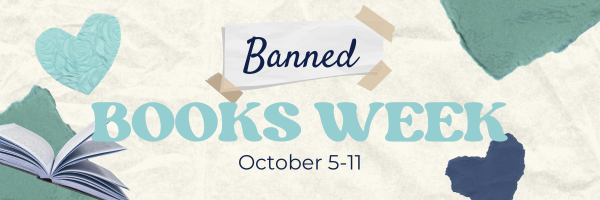As a parent, I think constantly about the books, shows, and content my young son encounters. I want him to have the freedom to explore ideas (even ideas I might not like), but I also want to make thoughtful choices about what he’s ready for. That means some books, at least for now, aren’t appropriate for him. And that’s okay. But that decision belongs to my husband and me; I don’t need someone else telling me what my child can or cannot read.
This is the principle that guides my thinking during Banned Books Week: I’m not advocating for adult material in children’s sections. But I am advocating for books that challenge our thinking—books that provoke questions, present perspectives we may not agree with, or introduce ideas that are uncomfortable. Keeping those books available for all readers is essential. Without access to stories about different beliefs, lives, and experiences, where does our empathy come from?
When I was in eighth or ninth grade, I picked out Looking for Alaska by John Green at Borders. As I handed it to the bookseller at checkout, he looked at my dad and said, “I’m not sure this book is appropriate for her age.” My dad’s response? “That’s not your decision.”
Around the same time, I brought home Sisterhood of the Traveling Pants by Ann Brashares. My parents were skeptical—after all, one of the rules of the pants was that you can’t let a boy take them off of you, but you can take them off in front of a boy. Rather than forbidding me to read it, however, they read it first. After I finished, we had conversations about the content they didn’t love but had determined I was mature enough to handle.
Both of those books were formative for me, as a teenager and now as a storyteller. Even more formative: The memory of my parents using material they found questionable as a teaching moment, not a catastrophe that required burning the books. That approach—trust, discussion, and guidance rather than prohibition—is what I hope for my son too.
But we will never have those powerful moments if books that might provoke questions are banned outright.
When we remove access to ideas, we remove opportunities for growth, empathy, and curiosity. The world becomes a little smaller, a little meaner, and a little less human. Reading is how we practice seeing the world through others’ eyes. It’s how writers learn to tell stories that matter.
So this Banned Books Week, I’m choosing action: I’m placing banned or challenged books in Little Free Libraries, sharing stories that matter, encouraging conversations about difficult topics at home and in our communities, and researching how I can support literacy and access long after this week ends. I invite you to do the same. Because stories belong to everyone—and the freedom to read is how we keep imagination, empathy, and curiosity alive.
Every book that survives a challenge is a chance for someone, somewhere, to discover a new perspective, a new story, or even a new sense of themselves. That’s why it matters. That’s why I fight for it.


